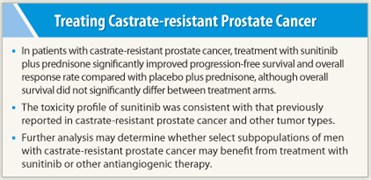 According to M. Dror Michaelson, MD, PhD, second-line therapy with sunitinib (Sutent) and prednisone improves progression-free survival but not overall survival in men with metastatic castrate-resistant prostate cancer previously treated with docetaxel-based chemotherapy. Dr. Michaelson, of the Massachusetts General Hospital in Boston, recently presented these findings at the 2011 ASCO Annual Meeting.1
According to M. Dror Michaelson, MD, PhD, second-line therapy with sunitinib (Sutent) and prednisone improves progression-free survival but not overall survival in men with metastatic castrate-resistant prostate cancer previously treated with docetaxel-based chemotherapy. Dr. Michaelson, of the Massachusetts General Hospital in Boston, recently presented these findings at the 2011 ASCO Annual Meeting.1
First-line therapy for men with metastatic castrate-resistant prostate cancer generally consists of docetaxel-based therapy. However, there are few effective therapeutic options for patients in whom disease subsequently progresses.
“A number of phase II clinical trials in advanced prostate cancer have suggested that sunitinib may have important efficacy and an acceptable safety profile,” said Dr. Michaelson. This randomized, placebo-controlled phase III trial compared the combination of sunitinib and prednisone to prednisone alone in men with metastatic castrate-resistant prostate cancer.
Study Design and Results
Eligible patients were required to have metastatic castrate-resistant prostate cancer and progressive disease, with resistance or intolerance to docetaxel. Patients were stratified by Eastern Cooperative Oncology Group performance status, type of disease progression (prostate-specific antigen–based only or radiographic), docetaxel-resistant or docetaxel-intolerant status, and prior therapy with a vascular endothelial growth factor (VEGF) inhibitor. Enrolled patients were randomly assigned in a 2:1 ratio to treatment with prednisone at 5 mg twice daily combined with either placebo or sunitinib at 37.5 mg on a continuous once-daily dosing schedule. The primary endpoint of the study was overall survival, with secondary endpoints of radiographic progression-free survival and decrease in pain.
 A total of 873 men were randomized to receive sunitinib (n = 584) or placebo (n = 289). Median age was 68 years, and 49% of patients had a Gleason score ≥ 8. The trial was stopped after a second futility analysis in September 2010. In data collected through February 2011, the median treatment duration was 3.7 months (range, 0−23.2) on the sunitinib arm and 3.4 months (range, 0−22.1) on the placebo arm. Progression-free survival was significantly greater on the sunitinib arm than the placebo arm (5.6 vs 3.7 months; HR = 0.74; P = .0022), although overall survival was not significantly different (13.1 vs 11.7 months; HR = 0.91; P = .1630, stratified log-rank test for both). The overall response rate with sunitinib was also significantly higher compared with placebo (6.1% vs 1.8%; P = .04).
A total of 873 men were randomized to receive sunitinib (n = 584) or placebo (n = 289). Median age was 68 years, and 49% of patients had a Gleason score ≥ 8. The trial was stopped after a second futility analysis in September 2010. In data collected through February 2011, the median treatment duration was 3.7 months (range, 0−23.2) on the sunitinib arm and 3.4 months (range, 0−22.1) on the placebo arm. Progression-free survival was significantly greater on the sunitinib arm than the placebo arm (5.6 vs 3.7 months; HR = 0.74; P = .0022), although overall survival was not significantly different (13.1 vs 11.7 months; HR = 0.91; P = .1630, stratified log-rank test for both). The overall response rate with sunitinib was also significantly higher compared with placebo (6.1% vs 1.8%; P = .04).
The safety profile for sunitinib was consistent with that previously reported in castrate-resistant prostate cancer and other tumor types, Dr. Michaelson noted. Leading treatment-related grade 3/4 adverse events with sunitinib and placebo were fatigue (16.5% vs 3.5%) and anemia (5.5% vs 2.5%). Substantially more patients in the placebo group discontinued treatment due to disease progression (50% vs 31%), while more patients in the sunitinib arm discontinued due to adverse events (26% vs 6%).
Would Subgroups Benefit More?
Dr. Michaelson concluded that “progression-free survival was significantly improved in men treated with sunitinib plus prednisone compared with placebo plus prednisone, although overall survival did not significantly differ between treatment arms.” Results of this trial demonstrate that while addition of sunitinib to prednisone improved progression-free survival in patients with metastatic castrate-resistant prostate cancer, it did not increase overall survival when used in the second-line setting. It is possible that selected patient subpopulations that do exhibit a survival advantage with sunitinib may be identified with further study. ■
Financial Disclosure: Dr. Michaelson has been a consultant for Abbott Laboratories, AVEO, Genentech, Novartis, Pfizer, and Wyeth, and has received research funding from Abbott Laboratories, Bayer, Genentech, GlaxoSmithKline, Novartis, Pfizer, and Wyeth.
Reference
1. Ou Y, Michaelson MD, Sengeløv L, et al: Randomized, placebo-controlled, phase III trial of sunitinib in combination with prednisone (SU+P) versus prednisone (P) alone in men with progressive metastatic castration-resistant prostate cancer (mCRPC). 2011 ASCO Annual Meeting. Abstract 4515. Presented June 6, 2011.

 Philip W. Kantoff, MD, of the Dana-Farber Cancer Institute, emphasized that this was essentially a negative study. “There is no evidence that VEGFR-targeted agents provide a survival benefit for men with advanced prostate cancer,” he indicated. “With shrinking resources and a rapidly improving...
Philip W. Kantoff, MD, of the Dana-Farber Cancer Institute, emphasized that this was essentially a negative study. “There is no evidence that VEGFR-targeted agents provide a survival benefit for men with advanced prostate cancer,” he indicated. “With shrinking resources and a rapidly improving...